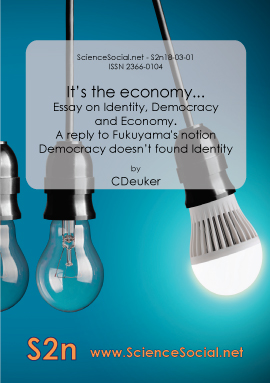
It’s the economy …
Essay on Identity, Democracy and Economy. A reply to Fukuyama’s notion Democracy doesn’t found Identity
by
CDeuker
cite as:
Deuker, C.; 2018; “It’s the economy … Essay on Identity, Democracy and Economy. A reply to Fukuyama’s notion Democracy doesn’t found Identity”; ScienceSocial.net; ISSN 2366-0104; S2n18-03-01; https://sciencesocial.net/
Funding Information:
This work was not funded by any grants, fellowships or donations
Copyright
Copyright and all rights are maintained by the author(s). It is understood that all persons copying this information will adhere to the terms and constraints invoked by each author’s copyright. These works may be reposted only with the explicit permission of the copyright holder. Permission is given to duplicate this document for personal use only, as long as it is unaltered and complete. Copies may not be duplicated for commercial purposes.
Content
1 References 4
2 Abstract 5
3 Communication and Identity 6
4 Identity and Institutions 8
5 Solidarity and Identity 9
6 Identity and Social Complexity 11
7 Economic impact 13
8 Governance, Democracy and Identity 15
1 References
Berger, P. L.; Luckmann, T.; 1969; “Die gesellschaftliche Konstruktion der Wirklichkeit. Eine Theorie der Wissenssoziologie”; Frankfurt a. Main; Fischer Taschenbuch Verlag; 3-596-26623-8
Bourdieu, P.; Wacquant, L. J. D.; 1996; “Reflexive Anthropologie”; Frankfurt am Main; Suhrkamp; 3-518-58229-1
Dürkheim, É.; 1996; “Über soziale Arbeitsteilung. Studie über die Organisation höherer Gesellschaften”; Frankfurt am Main; Suhrkamp; 3518286056
Fukuyama, F.; 2013; “What Is Governance”; 1-18; CGD Working Paper; 2013/314;
Fukuyama, F.; 2015; “Why is Democracy performing so poorly”; 11-20; Journal of Democracy; 1045-5736; 26/1;
Giddens, A.; 1995; “Die Konstitution der Gesellschaft: Grundzüge einer Theorie der Strukturierung”; Frankfurt, New York; Campus Verlag; 3-593-34644-x
Luhmann, N.; 1987; “Soziologische Aufklärung 4. Beiträge zur Funktionalen Differenzierung der Gesellschaft”; Opladen; Westdeutscher Verlag; 3-531-11885-4
Luhmann, N.; 1996; “Arbeitsteilung und Moral. Durkheims Theorie”; 19-40; In: Durkheim, É.;Luhmann, N.;”Über soziale Arbeitsteilung”; Frankfurt a. M.; Suhrkamp Verlag
Reckwitz, A.; 2004; “Die Reproduktion und die Subversion sozialer Praktiken : zugleich ein Kommentar zu Pierre Bourdieu und Judith Butler”; 40-54; In: Doing Culture : neue Positionen zum Verhältnis von Kultur und sozialer Praxis”; Bielefeld; transcript Verl.
Thumann, M.; Assheuer, T.; 2016; “Francis Fukuyama: ‘Demokratie stiftet keine Identität’. Ist das Modell des Westens am Ende? Ein Gespräch mit dem amerikanischen Politikwissenschaftlers Francis Fukuyama “; die Zeit; 2016/13; 17.03.2016; http://www.zeit.de/2016/13/francis-fukuyama-politikwissenschaftler-populismus-usa
2 Abstract
The motivation to this essay came from an interview with Francis Fukuyama in the German newspaper ‘Die Zeit’ with the heading that democracy does not found identity [Thumann, M.; Assheuer, T.; 2016].
In this essay it is argued, that identity is a product of social communication through the internalization of not self-induced references to social categories by social practices. The immediate reciprocity of social practices provides the evolution of identity. Complexity of social communication is affected by quality and quantity. The economic impact towards society is increasing interactions and social complexity. Focusing on the quality of social practices will lead to mechanic solidarity, which is based on finding differences. Focusing on the quantity of social practices will lead to organic solidarity or the acceptance of differences. Complexity of social communication is balanced through the quality of mechanic and quantity of organic solidarity.
Formal institutions, based on the democratic idea of a conjoint social system, can foster the evolution of identity to a growing population by diminishing social complexity though social practices and organic solidarity. Mechanic solidarity with the focus on quality is diminishing complexity by a reduction in the reference unit or population.
The economic impact towards society with qualitative and quantitative aspects in communicational complexity is fundamental for governance and formal institutions and affecting identity.
read more …
Order hardcopy for €30,- incl. shipping
You can order a hardcopy of ‘Its the economy…-S2n-18-03-01‘ for €30,- including shipping costs just by mail.
Please fill out the relevant information in this mail. You will receive a PayPall bill by mail (preferred) or the bank account information.
Order ‘It’s the economy… S2n-18-03-01‘.
Full text can be downloaded at the CopySave ebook Store with the free version of CopySafePDF Reader. Other readers have problems with their security functions.
This software can be downloaded and used for free here: CopySafePDF – Reader. Read further information to CopySafePDF here. (note: as long as CopySafePDF is opened your clipboard is disabled).